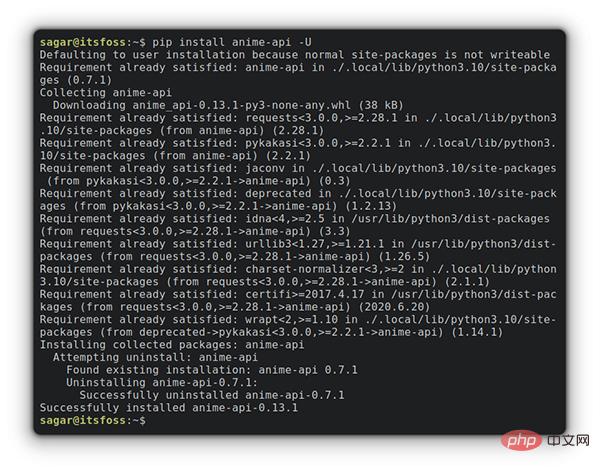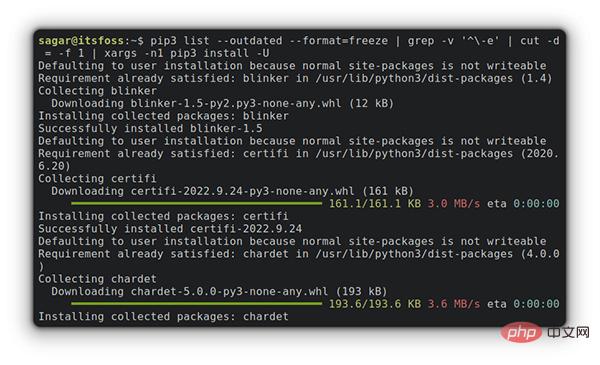Upgrading Python packages using Pip

When was the last time you updated a Python package installed via Pip? Most users tend to forget that these Python packages also need to be updated manually since just updating the system repository does not work for the packages.
So let’s take a moment to look at how to use Pip to update older Python packages.
How to use Pip to upgrade Python software packages
Pip (Pip Installs Packages) is a command line utility for managing Python software packages command line utility. You can use Pip to install Python packages, similar to how you use apt to manage packages in Ubuntu and Debian.
So, let’s take a closer look at how to use this awesome tool Pip to manage content related to Python packages.
1. List outdated Python software packages
Before planning to update any software packages, we must first list the outdated software packages, and you can choose the ones you want to update. packages, since most people won't want to update their entire package repository at once.
To list obsolete Python packages, you just need to combine the pip command with the list option, The --outdated flag can be used together, as shown below:
pip list --outdated

##outdated packages
2 , Upgrade specific software packagesAfter obtaining the list of updateable software packages, you can select the specific software package you want to update as I mentioned before. The syntax of the pip upgrade package command is as follows :pip install package_name -U
anime-api to the latest version, so I will use the following command to upgrade:
pip install anime-api -U

update anime api
3. Upgrade the software package to a specific versionIt is not necessary to always use software The latest version. If you want to upgrade the package to a specific version that is not the latest, refer to the following command syntax:pip install --upgrade <package>==<version>
xdg The software package is updated to version 5.1, which is the previous version of the latest version, so you can use the following command:
pip install --upgrade xdg==5.1

4. Use Pip to upgrade all packages at once
Please note: I do not recommend that you upgrade all packages at once, because the dependencies of Python packages are too complex. , a one-time upgrade cannot handle interdependencies.To upgrade all python packages at once, you can use the following command:
pip3 list --outdated --format=freeze | grep -v '^-e' | cut -d = -f 1 | xargs -n1 pip3 install -U

The above command uses
xargs. First, you will get all the software packages that need to be updated, and then execute the pip3 install -U command for each software package. <p>I am using <code style="background-color: rgb(231, 243, 237); padding: 0px 3px; border-radius: 4px; overflow-wrap: break-word; text-indent: 0px;">pip3 here instead of pip. In Ubuntu 22.04 and higher, both the pip and pip3 commands can be used.
Summary
Using Pip to update all Python packages at once is not a good idea. I found that after a one-time update, dependencies between packages were broken, so make sure to only update the packages you want to update.
The above is the detailed content of Upgrading Python packages using Pip. For more information, please follow other related articles on the PHP Chinese website!

Hot AI Tools

Undresser.AI Undress
AI-powered app for creating realistic nude photos

AI Clothes Remover
Online AI tool for removing clothes from photos.

Undress AI Tool
Undress images for free

Clothoff.io
AI clothes remover

AI Hentai Generator
Generate AI Hentai for free.

Hot Article

Hot Tools

Notepad++7.3.1
Easy-to-use and free code editor

SublimeText3 Chinese version
Chinese version, very easy to use

Zend Studio 13.0.1
Powerful PHP integrated development environment

Dreamweaver CS6
Visual web development tools

SublimeText3 Mac version
God-level code editing software (SublimeText3)

Hot Topics
 1377
1377
 52
52
 Do mysql need to pay
Apr 08, 2025 pm 05:36 PM
Do mysql need to pay
Apr 08, 2025 pm 05:36 PM
MySQL has a free community version and a paid enterprise version. The community version can be used and modified for free, but the support is limited and is suitable for applications with low stability requirements and strong technical capabilities. The Enterprise Edition provides comprehensive commercial support for applications that require a stable, reliable, high-performance database and willing to pay for support. Factors considered when choosing a version include application criticality, budgeting, and technical skills. There is no perfect option, only the most suitable option, and you need to choose carefully according to the specific situation.
 HadiDB: A lightweight, horizontally scalable database in Python
Apr 08, 2025 pm 06:12 PM
HadiDB: A lightweight, horizontally scalable database in Python
Apr 08, 2025 pm 06:12 PM
HadiDB: A lightweight, high-level scalable Python database HadiDB (hadidb) is a lightweight database written in Python, with a high level of scalability. Install HadiDB using pip installation: pipinstallhadidb User Management Create user: createuser() method to create a new user. The authentication() method authenticates the user's identity. fromhadidb.operationimportuseruser_obj=user("admin","admin")user_obj.
 Navicat's method to view MongoDB database password
Apr 08, 2025 pm 09:39 PM
Navicat's method to view MongoDB database password
Apr 08, 2025 pm 09:39 PM
It is impossible to view MongoDB password directly through Navicat because it is stored as hash values. How to retrieve lost passwords: 1. Reset passwords; 2. Check configuration files (may contain hash values); 3. Check codes (may hardcode passwords).
 Python: Exploring Its Primary Applications
Apr 10, 2025 am 09:41 AM
Python: Exploring Its Primary Applications
Apr 10, 2025 am 09:41 AM
Python is widely used in the fields of web development, data science, machine learning, automation and scripting. 1) In web development, Django and Flask frameworks simplify the development process. 2) In the fields of data science and machine learning, NumPy, Pandas, Scikit-learn and TensorFlow libraries provide strong support. 3) In terms of automation and scripting, Python is suitable for tasks such as automated testing and system management.
 How to optimize MySQL performance for high-load applications?
Apr 08, 2025 pm 06:03 PM
How to optimize MySQL performance for high-load applications?
Apr 08, 2025 pm 06:03 PM
MySQL database performance optimization guide In resource-intensive applications, MySQL database plays a crucial role and is responsible for managing massive transactions. However, as the scale of application expands, database performance bottlenecks often become a constraint. This article will explore a series of effective MySQL performance optimization strategies to ensure that your application remains efficient and responsive under high loads. We will combine actual cases to explain in-depth key technologies such as indexing, query optimization, database design and caching. 1. Database architecture design and optimized database architecture is the cornerstone of MySQL performance optimization. Here are some core principles: Selecting the right data type and selecting the smallest data type that meets the needs can not only save storage space, but also improve data processing speed.
 The 2-Hour Python Plan: A Realistic Approach
Apr 11, 2025 am 12:04 AM
The 2-Hour Python Plan: A Realistic Approach
Apr 11, 2025 am 12:04 AM
You can learn basic programming concepts and skills of Python within 2 hours. 1. Learn variables and data types, 2. Master control flow (conditional statements and loops), 3. Understand the definition and use of functions, 4. Quickly get started with Python programming through simple examples and code snippets.
 How to use AWS Glue crawler with Amazon Athena
Apr 09, 2025 pm 03:09 PM
How to use AWS Glue crawler with Amazon Athena
Apr 09, 2025 pm 03:09 PM
As a data professional, you need to process large amounts of data from various sources. This can pose challenges to data management and analysis. Fortunately, two AWS services can help: AWS Glue and Amazon Athena.
 Can mysql connect to the sql server
Apr 08, 2025 pm 05:54 PM
Can mysql connect to the sql server
Apr 08, 2025 pm 05:54 PM
No, MySQL cannot connect directly to SQL Server. But you can use the following methods to implement data interaction: Use middleware: Export data from MySQL to intermediate format, and then import it to SQL Server through middleware. Using Database Linker: Business tools provide a more friendly interface and advanced features, essentially still implemented through middleware.





